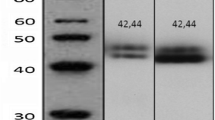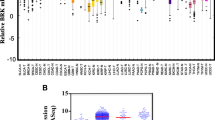Abstract
Background
Src kinase, a non-receptor tyrosine kinase, is overexpressed and highly activated in a number of human cancers and appears to show a significant relationship with breast cancer progression. Recent in vitro studies have suggested that Src kinase may be involved in tamoxifen resistance.
Methods
Immunohistochemistry was performed on 392 resected breast cancers using an antibody to c-Src. Expression was assessed using the weighted histoscore method.
Results
Forty-five percentage of breast tumours exhibited nuclear, 46% cytoplasmic and 7% membrane expression. Lymph node positivity correlated with cytoplasmic c-Src tumour expression levels (P < 0.001). Nuclear c-Src correlated negatively with cytoplasmic and membrane c-Src expression (P < 0.001, P = 0.005). High expression levels of cytoplasmic c-Src was associated with worse disease-specific survival (P = 0.026) after completing 5 years of tamoxifen therapy. However, high expression of c-Src at any cellular location did not show any association with de novo relapse on tamoxifen (c-Src nuc P = 0.906, c-Src cyto P = 0.735 and c-Src memb P = 0.791).
Conclusions
No translational evidence was found in this study to support a role for Src kinase in developing de novo tamoxifen resistance. However, based on our findings on late clinical outcome, patients with high cytoplasmic c-Src may be selected for continuing endocrine therapy to prevent worsening prognosis.


Similar content being viewed by others
References
Biscardi JS, Ishizawar RC, Silva CM, Parsons SJ (2000) Tyrosine kinase signalling in breast cancer: epidermal growth factor receptor and c-Src interactions in breast cancer. Breast Cancer Res 2:203–210
Bjorge JD, Jakymiw A, Fujita DJ (2000) Selected glimpses into the activation and function of Src kinase. Oncogene 19:5620–5635
Campbell EJ, McDuff E, Tatarov O, Tovey S, Brunton V, Cooke TG, Edwards J (2008) Phosphorylated c-Src in the nucleus is associated with improved patient outcome in ER-positive breast cancer. Br J Cancer 99:1769–1774
Elsberger B, Tan BA, Mitchell TJ, Brown SB, Mallon EA, Tovey SM, Cooke TG, Brunton VG, Edwards J (2009) Is expression or activation of Src kinase associated with cancer-specific survival in ER-, PR- and HER2-negative breast cancer patients? Am J Pathol 175:1389–1397
Frame MC (2002) Src in cancer: deregulation and consequences for cell behaviour. Biochim Biophys Acta 1602:114–130
Hiscox S, Morgan L, Green TP, Barrow D, Gee J, Nicholson RI (2006) Elevated Src activity promotes cellular invasion and motility in tamoxifen resistant breast cancer cells. Breast Cancer Res Treat 97:263–274
Keam SJ (2008) Dasatinib: in chronic myeloid leukemia and Philadelphia chromosome-positive acute lymphoblastic leukemia. BioDrugs 22:59–69
Kim H, Laing M, Muller W (2005) c-Src-null mice exhibit defects in normal mammary gland development and ERalpha signaling. Oncogene 24:5629–5636
Kirkegaard T, Edwards J, Tovey S, McGlynn LM, Krishna SN, Mukherjee R, Tam L, Munro AF, Dunne B, Bartlett JM (2006) Observer variation in immunohistochemical analysis of protein expression, time for a change? Histopathology 48:787–794
Mamidipudi V, Dhillon NK, Parman T, Miller LD, Lee KC, Cartwright CA (2007) RACK1 inhibits colonic cell growth by regulating Src activity at cell cycle checkpoints. Oncogene 26:2914–2924
Morgan L, Gee J, Pumford S, Farrow L, Finlay P, Robertson J, Ellis I, Kawakatsu H, Nicholson R, Hiscox S (2009) Elevated Src kinase activity attenuates Tamoxifen response in vitro and is associated with poor prognosis clinically. Cancer Biol Ther 8:1550–1558
Nigg EA, Sefton BM, Hunter T, Walter G, Singer SJ (1982) Immunofluorescent localization of the transforming protein of Rous sarcoma virus with antibodies against a synthetic src peptide. Proc Natl Acad Sci USA 79:5322–5326
Planas-Silva MD, Bruggeman RD, Grenko RT, Stanley SJ (2006) Role of c-Src and focal adhesion kinase in progression and metastasis of estrogen receptor-positive breast cancer. Biochem Biophys Res Commun 341:73–81
Sandilands E, Brunton VG, Frame MC (2007) The membrane targeting and spatial activation of Src, Yes and Fyn is influenced by palmitoylation and distinct RhoB/RhoD endosome requirements. J Cell Sci 120:2555–2564
Schiff R, Massarweh SA, Shou J, Bharwani L, Mohsin SK, Osborne CK (2004) Cross-talk between estrogen receptor and growth factor pathways as a molecular target for overcoming endocrine resistance. Clin Cancer Res 10:331S–336S
Tatarov O, Mitchell TJ, Seywright M, Leung HY, Brunton VG, Edwards J (2009) SRC family kinase activity is up-regulated in hormone-refractory prostate cancer. Clin Cancer Res 15:3540–3549
Timpson P, Jones GE, Frame MC, Brunton VG (2001) Coordination of cell polarization and migration by the Rho family GTPases requires Src tyrosine kinase activity. Curr Biol 11:1836–1846
Verbeek BS, Vroom TM, Adriaansen-Slot SS, Ottenhoff-Kalff AE, Geertzema JG, Hennipman A, Rijksen G (1996) c-Src protein expression is increased in human breast cancer. An immunohistochemical and biochemical analysis. J Pathol 180:383–388
Yeatman TJ (2004) A renaissance for SRC. Nat Rev Cancer 4:470–480
Acknowledgments
We would like to acknowledge the continuing support Breast Cancer Research in Glasgow receives from Think Pink Ladies Glasgow.
Conflict of interest
We declare that we have no conflict of interest.
Author information
Authors and Affiliations
Corresponding author
Rights and permissions
About this article
Cite this article
Elsberger, B., Paravasthu, D.M., Tovey, S.M. et al. Shorter disease-specific survival of ER-positive breast cancer patients with high cytoplasmic Src kinase expression after tamoxifen treatment. J Cancer Res Clin Oncol 138, 327–332 (2012). https://doi.org/10.1007/s00432-011-1096-8
Received:
Accepted:
Published:
Issue Date:
DOI: https://doi.org/10.1007/s00432-011-1096-8




